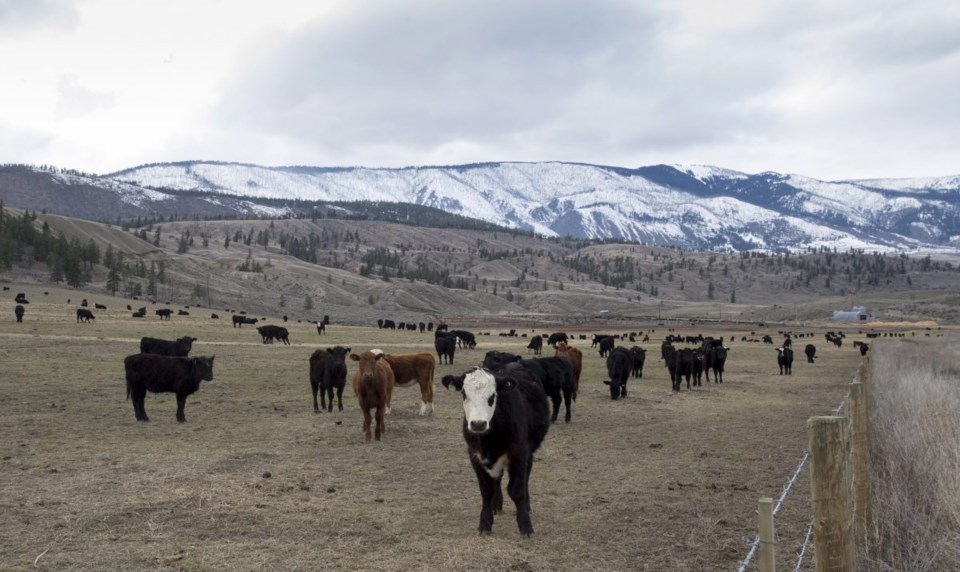ROCKY VIEW COUNTY— Working to ensure protein can get from the farm to the table, Alberta Beef Producers are hard at work adjusting to the COVID-19 pandemic.
The virus has created a new reality, rancher John Buckley said, but the timing has been serendipitous because it arrived during calving season— a time when ranchers naturally isolate. Buckley is a third-generation rancher in Jumping Pound.
“Essentially our ranch, our team, made the decision two weeks ago to put the ranch in lockdown,” Buckley said. “Unless it’s essential that you be here you can’t come.”
It is pivotal to have the lockdown in place, he said, because they need to keep the ranch's five team members healthy because animals depend on them.
“We’re running around the clock trying to keep everything safe, and functioning and alive,” Buckley said.
There is an added challenge this calving season because they are facing one of the worst springs they have seen in a long time, Buckley said.
His ranch has snowbanks that have been intact since October and temperatures hovering around -10C accompanied by 40km/h winds.
“The conditions that exist are lethal to newborn calves,” Buckley said.
He added that a bull sale he typically goes to at the end of April has changed the format to move everything online.
It is a huge difference in how bulls are sold, Buckley said, explaining that they have been working with the sale for more than 40 years.
Rod McLeod owns a ranch located north of Cochrane and works as a livestock auctioneer at a number of sales across Western Canada.
McLeod said hosting auctions has been dramatically transformed by COVID-19— largely due to the public health measures that have been put in place.
Sales that would have typically drawn 250 to 300 people can now only have around 14 people— including the sales hosts.
“What we found is that we’re going to these sales and some people are coming and looking at the cattle prior to the sale when there’s no people around so they can keep the social distancing aspect up,” McLeod said. “The presence of the Internet and the telephones and the odd person shows up at the sale. You can see the decline from the sales we had early when we weren’t being effected to the sales at the end— every day there would be less people.”
The agriculture community has been incredibly supportive of each other during the virus, McLeod said, explaining that he has not seen a decline in the sales of bulls. As of now, the sales levels are on par with what prices for breeding bulls were in 2019.
Finished cattle and feeder market is a different story, McLeod said.
Despite the challenges faced, ranchers have yearly cycles that need to be maintained despite the COVID-19 pandemic, McLeod said.
“You can’t put a ranching or cattle operation on hold for three months or four months,” McLeod said. “It has to continue.”
Agriculture has been deemed an essential service by the provincial and federal governments, said Kelly Smith-Fraser chairperson for Alberta Beef Producers and rancher at Pine Lake.
As an essential service, the industry has not really seen a big change in terms of the supply change— the biggest transition has been how business is conducted.
The purebred industry has been able to adapt quickly to ensure they can still do business and get animals sold, she said. McLeod added that it is great agriculture has been declared an essential service so borders have remained open. The ability of beef to cross international borders has helped maintain prices.
“Right now most of us are just head-down calving out cows, working hard and so we don’t really see the effects until maybe you might run into town,” Smith-Fraser said.
Ranchers have been adjusting to COVID-19, she said, explaining that public health measures were introduced amid the bull sale season.
“Those producers have spent two years getting ready for that bull sale,” Smith-Fraser said. “They bred those cows two years ago they calved out the cows last year and they have spent this past year conditioning and getting those bulls ready for sale.”
It has been a challenging change of business operations, Smith-Fraser said, because pure-bred producers holding the sales were left scrambling to find innovative ways to ensure the sales could still be held while following public health measures.
Online platforms have been used for bull sales, she said, explaining that they are typically used in tandem with live auctioneers.
If the public health measures last until October when large breed shows begin, she said, they may see COVID-19 begin to affect cattle prices in the purebred industry.
Smith-Fraser said she is grateful bulls sales have been strong and prices, for now, appear to be holding steady on par with last year.
“It definitely was a different way of doing business for all of us,” Smith-Fraser said.




